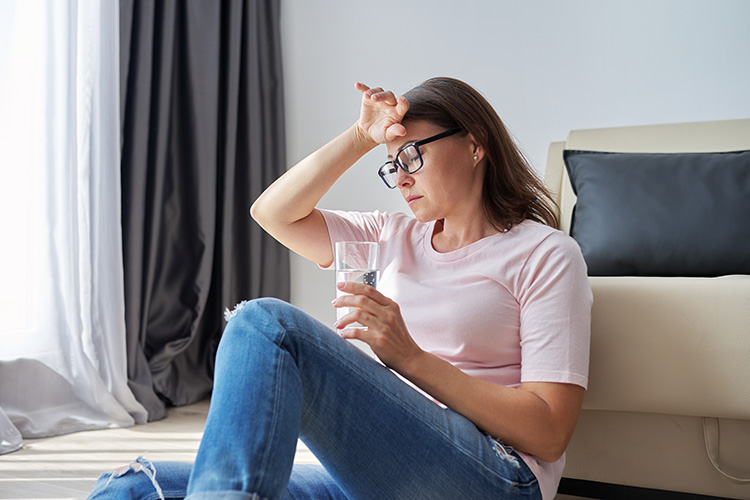East Melbourne VIC 3002
Perimenopause: Signs, Symptoms & What To Expect

Menopause is defined as the absence of periods for 12 months or more. However, there is a transition period prior to the development of menopause and this transition period is called perimenopause.
What Is Perimenopause?
Perimenopause is the period of time when oestrogen production is slowly reducing, fertility reduces and ovulation often becomes irregular or absent altogether, showing the early signs of menopause. This usually occurs one year after your last period.

What is the average age for Perimenopause to Start?
The average age to go through perimenopause varies considerably between different women, though often occurs around 8-10 years before menopause. The average age for women to start going through menopause in Australia is 52 years old.
Perimenopause commences as there is a controlling centre within a part of the brain called the hypothalamus. This pulses a hormone called GnRH. This is a time-related event and runs a natural course to a time when the centre reduces activity.
For many women, this can occur several years before their periods stop altogether or for others, it may only be a few months before your period stops completely. As all women are different your perimenopause/menopause stage is completely individual.
How Long Does Perimenopause Last?
Perimenopause can last 4-5 years before the onset of menopause but for some women, it may last longer and for other women, it occurs over a short period of time. Individual variation is built into all biological events.
What Hormone Changes Occur During Perimenopause?
Perimenopause is the time before menopause when you experience menopausal symptoms but are still having periods. These periods typically change during perimenopause and may occur further apart or closer together. They can be more irregular and heavier or lighter inflow.
During perimenopause, your ovaries stop working gradually over a period of time (unless you have surgical menopause) and your body starts reacting to the declining level of hormones, in particular oestrogen. This is a gradual effect and symptoms commence at a certain threshold level which is variable from woman to woman.
During the perimenopause hormone levels often fluctuate which means that women can feel completely well for much of the time and then have episodes of feeling dreadful when their hormone levels reduce.

Signs & Symptoms of Perimenopause
Common symptoms of perimenopause include:
- Hot flushes
- Insomnia
- Mood changes
- Vaginal dryness
- Loss of libido
- Brain fog
- Night Sweats
These symptoms are essentially identical to the symptoms of menopause itself but are often less severe.
How Does Perimenopause Affect Your Period?
During perimenopause you still may have periods but there may be some changes such as the cycle being more or less regular or heavier or lighter periods. This is because ovulation regulates your cycle and perimenopause is often associated with cycles with poor or absent ovulation. Your regular 28 to 35-day cycle often lengthens and can become a 50 to 60-day cycle or you may miss one or a number of periods altogether.
You may enter or come out of perimenopause which means your cycle may go from being irregular to regular and then back again. Your periods can become heavier or lighter. This varies from woman to woman.
How is Perimenopause Diagnosed?
Perimenopause is diagnosed by symptoms and signs, mainly being an irregular cycle, missing periods and the symptoms that have been mentioned above. Scientifically it is defined as having a pituitary hormone level (FSH) as over 25. However, this can be an unreliable test as the level can vary from day to day.
Treatment for Perimenopause
The treatment of perimenopause depends on the severity of the symptoms and the patient’s wishes. You should discuss the pros and cons of menopausal hormone therapy (MHT) formerly known as HRT with your medical provider. In general, symptoms interfering with your quality of life are more likely needed to be addressed.
Lifestyle changes are also important and these include having good sleep patterns, minimising stress, adequate exercise and good weight control.

When Should I Seek a Doctor’s Opinion?
It is important to seek medical advice when you have symptoms that are concerning for you or are interfering with your quality of life. Such symptoms can include heavy or irregular periods, symptoms of oestrogen deficiency such as hot flushes, vaginal dryness, mood changes, symptoms of anxiety and loss of libido.
The average age of entering perimenopause in Australia is 48 years and perimenopause is a period of slowly declining oestrogen production from the ovaries. Every woman will eventually go through perimenopause – the actual timing of this event varies between different individuals.
The symptoms of oestrogen deficiency are identical to the symptoms of menopause itself. Whether or not treatment is indicated depends upon the patient’s wishes after the pros and cons of MHT (HRT) have been discussed in detail.mIn essence, any symptom that substantially interferes with your quality of life is important to address. At this stage of your life, it is important that lifestyle issues are also considered.
-
Can You Get Pregnant During Perimenopause?You can enter and come out of perimenopause over a period of time and this means that your fertility can fluctuate. In over 35 years of practising gynaecology, Dr Kliman has had three patients who have met the criteria for perimenopause but then have come out of the perimenopause and have started cycling regularly and eventually conceived. This is, however, extremely rare.
-
What Natural/Home Remedies Can I Use for Perimenopause?There is no scientific evidence that natural medications such as soy-based oestrogen are effective for any substantial period of time to treat perimenopause. If a patient does not wish to take medically prescribed MHT (HRT) then certainly lifestyle changes are probably more effective than natural treatment. Some women, however, do obtain symptom relief from natural treatment but this is thought in most cases to be a placebo response.
With over 30 years experience in the field, Dr Len Kliman is highly regarded as one of Melbourne’s leading gynaecologists. He has vast experience in the diagnosis and treatment of a wide range of women’s gynaecological and vaginal issues and was recently appointed as an Associate Professor by the University of Melbourne Clinical School.








